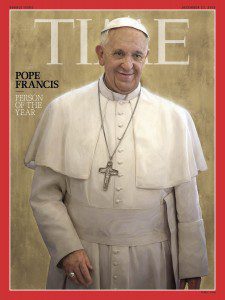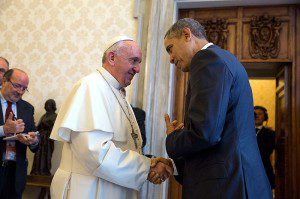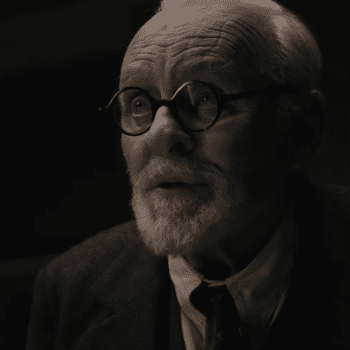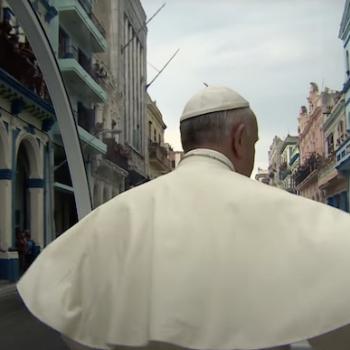I typically deal with entertainment here at the Watching God blog, but its mission extends to pop culture, too. And at this moment in American pop culture, all eyes are on Pope Francis. Even though he’s only been in the United States for a couple of days, some believe he’s already overstayed his welcome.
Francis opened a joint session of Congress this morning, and his address struck many as overtly political. He called on the country to swing open its doors for refugees. He attacked abortion, reminding politicians of “our responsibility to protect and defend human life at every stage of its development.” He called for the end of the death penalty, asked for action regarding climate change and, most galling to conservatives, hinted that a little redistribution of wealth might not be amiss:
I would encourage you to keep in mind all those people around us who are trapped in a cycle of poverty. They too need to be given hope. The fight against poverty and hunger must be fought constantly and on many fronts, especially in its causes. … It goes without saying that part of this great effort is the creation and distribution of wealth.
For many conservatives, Francis feels a little too liberal for their taste. One congressman, Arizona Republican Paul Gosar, boycotted Francis’ speech because of the Pope’s views on climate change. Many other conservative pundits, including the great George Will, have taken issue with Francis’ political statements. “Pope Francis embodies sanctity but comes trailing clouds of sanctimony,” Will wrote. New Republic Editor Jeet Heer writes that Francis’ right-leaning critics are telling the Pope that “the proper role of the church is promoting individual salvation and social morality, a mission Francis is jeopardizing by advocating for political change.” More progressive pundits, meanwhile, have loved much of what Francis has had to say (even as they skip over his thoughts on abortion).
It’s pretty fascinating, this dynamic. As a longtime religion reporter and an evangelical Christian—a movement often associated with the Religious Right—the split has historically looked much different to me. I’ve seen plenty of politically active religious organizations in action. I’ve heard from many on the left tell me that religion has no place in politics.
And yet, faith is inherently political.
Now, don’t misunderstand me: The government should not sponsor religion. Ministries should not campaign for politicians. A division between church and state is A-OK with me, and whenever either has gotten too close to the other, there’ve been … issues.
 But here’s the thing: Politics—at least politics as it manifests itself in the United States—is an exercise in morality. It’s intrinsically about justice and grace. It’s about how we want to live and how we want to treat others. When we talk about “moral issues,” it’s often code for abortion and gay rights. But in my way of thinking, the definition of morality is far broader. Tax reform? The environment? Foreign policy? How we think about these issues and dozens of others is predicated not just in self-interest or national pragmatism, but in what we believe is right. Do you believe that minimum-wage workers deserve a higher working wage? Do you believe that a higher minimum wage would only hurt those very workers, given that employers might have to enact layoffs? Well, that obviously makes it a moral issue too. And everyone, be they Republican or Democrat, conservative or liberal, is making moral judgments in the voting booth.
But here’s the thing: Politics—at least politics as it manifests itself in the United States—is an exercise in morality. It’s intrinsically about justice and grace. It’s about how we want to live and how we want to treat others. When we talk about “moral issues,” it’s often code for abortion and gay rights. But in my way of thinking, the definition of morality is far broader. Tax reform? The environment? Foreign policy? How we think about these issues and dozens of others is predicated not just in self-interest or national pragmatism, but in what we believe is right. Do you believe that minimum-wage workers deserve a higher working wage? Do you believe that a higher minimum wage would only hurt those very workers, given that employers might have to enact layoffs? Well, that obviously makes it a moral issue too. And everyone, be they Republican or Democrat, conservative or liberal, is making moral judgments in the voting booth.
For many of us, our morality—our sense of justice and goodness and righteousness—is predicated on our faith. We believe that determining what’s right and wrong isn’t, ultimately up to us, but to God. When you look at some of the most powerful societal reforms in history, the faith of many leaders was absolutely intrinsic to their advocacy. To ask that our faith not be a prime instrument in how we’d like the world around us to look and feel seems just unrealistic.
None of this is to condone or condemn what Francis actually said. But for me, he’s a reminder that faith can be—and should be—a powerful motivator to change this world, not just a way to look forward to the one to come.














